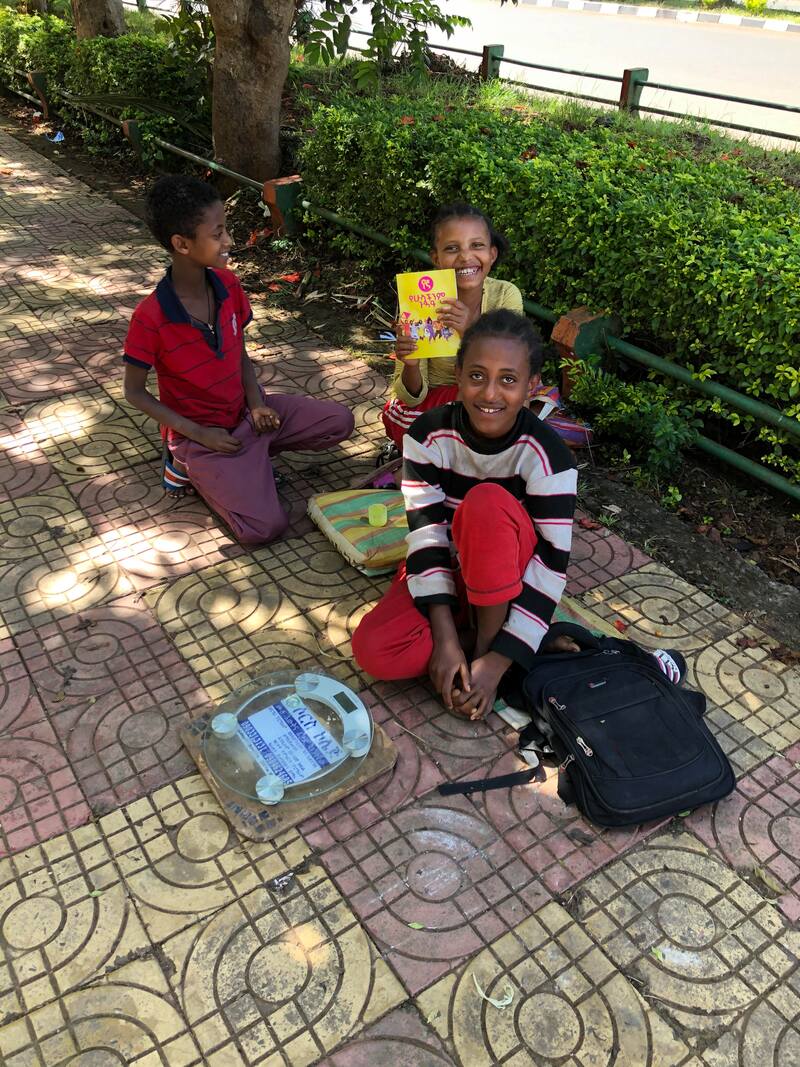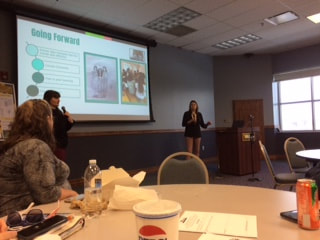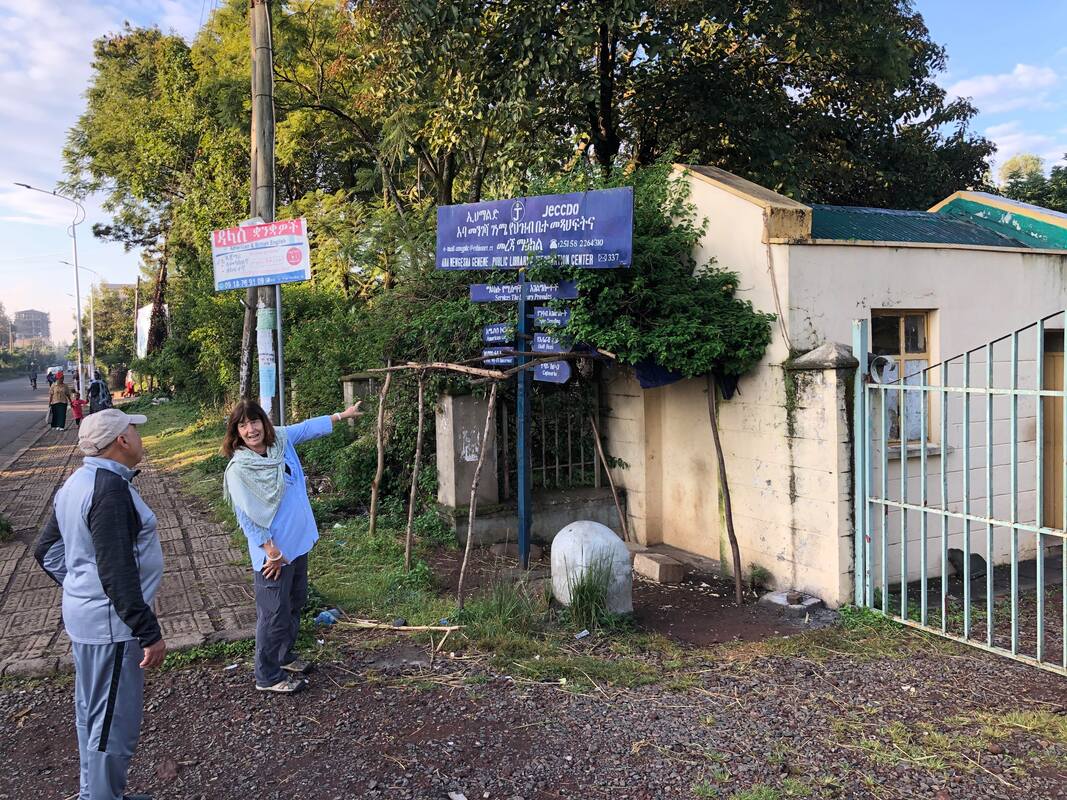|
Timkat exceeded my high expectations. It was so beautiful and colorful. There was music and dancing and religious ceremonies that take place over three days. But most memorable in Ethiopia is the people, and Timkat was no exception. They welcomed us and were proud to have us be a part of their UNESCO World Heritage Event. The event celebrates Epiphany, John's baptism of Jesus and includes the symbol of the Ark of the Covenant. Its replica is in each Ethiopian Church. It is called a Tabot and is carried on a priests head from each church to a central location on day one. On day two all the Talbots are returned to their respective churches in another procession except one. St. Michael's church stays at the central location for an extra day. Above you can see St. Michael's Talbot being returned in what was probably the single biggest procession I have ever seen. We enjoyed it from the balcony and roof top of my hotel. I could not have done that in Gonder. I cannot adequately capture the amazing beauty and celebration of Timkat here. You can learn more about it at https://www.thetravelmagazine.net/timkat-festival-ethiopia.html On day two pilgrims start the day by coming to the central place where the Tabots were kept overnight to get baptized again. In Bahir Dar at one location I understand they used Lake Tana to baptize. But where I was they used firehoses. Some of the priests seemed to enjoy dousing their flock with the holy water. I saw lots of cold, wet pilgrims leaving the park. Some stopped for sugar cane for quick energy. Below, you can see the colorful groups that march with the floats and priests to return the Tabots (Arks of the Covenant) back to their rightful churches. People sweep the streets with palm fronds, symbolic of palm Sunday) ahead of the red carpet, which is laid down ahead of the musicians, dancers, floats and priests carrying the Tabots (Arks of the Covenant) on their heads. Incense burns constantly. This goes on for miles. The carpet carriers below are very earnest. A wardrobe malfunction is fixed on the fly during the parade Sugar cane is brought in on these donkey carts and sold as a snack at the festival. I understand this is a relatively new tradition, but a good one I think. Of course, you can also get a Coca Cola for your sugar fix. Below is a vendor who harkens back to a much older tradition. Male suiters used to propose to a young woman during Timkat by throwing a lime at her. A throwback that isn't taken seriously today.  Below is the first day of Timkat. As noted before, replicas of the Ark of the Covenant (Tabots) held in each Ethiopian church are carried on the top of priests' heads to a central location in the community. That was a park near the lake in my part of Bahir Dar. There is dancing and blessing of water for baptisms. As I left the gathering on the first day of Timkat this guy below charmed me into getting a cross painted on my arm. I waived him off at first and he gave me a perfect "buzz killer" look. The only thing to do was set the price. He asked for too much at first so I started to walk off again. He said okay, he'd do it for free. Just to pain a Ferengi's arm I suppose. He really did a great job and, of course, I paid him what we both decided was a fair price. This street scene captured from my balcony was my initiation into Ethiopia's Timkat. The crowds, the colorful floats and the festive atmosphere were Ethiopia at its finest. They are ceremoniously moving the Tabot from each church to a central location for the blessing of baptismal waters. Many people seemed disappointed I did not go to Gonder, where the Timkat celebration is considered superior. But Bahir Dar is my home. I wanted to experience it here. One benefit of Timkat was I was permitted into an Ethiopian Church, the newest and biggest church in Bahir Dar. Getting inside probably had more to do with Zewdu being with me than the Timkat festivities. People are gathering to witness the return of this church's Tabot (Ark of the Covenant) on day 2 here.
0 Comments
My friend and colleague Zewdu invites me to have lunch with his family often. He and his family know how much I enjoy good food, especially their home cooking. He also knows I really enjoy a view into the culture and family life. But most important is the chance to relax and talk.
Today was special because I finally got to see them make injera. Injera is a mystery to many in the west. It is a spongy, sour dough flat bread. The staff of life in Ethiopia and Eritrea, but no where else I know of. “Authentic” injera is made with an ancient grain called teff. Teff comes in light and dark colors. To my knowledge, it was only grown in Ethiopia and Eritrea until recently. Since it is gluten free and very healthy teff is becoming more popular in the United States. It is starting to be grown there, perhaps a result of being a healthy ancient gluten free grain and the increase in Ethiopian restaurants in the U.S. Ethiopians are usually surprised that I eat injera and the Ethiopian food that comes with it, much less like it. I think it can sit a little heavy on the stomach of the uninitiated. It tastes a little sour. But scoop up some tegabino with it and it becomes part of a delicious meal. Since this experience I have also watched injera made over an open fire. I eat it every day, though not usually every meal like Ethiopians typically do. The injera griddle takes up a lot of space in an Ethiopian kitchen, as does injera in the Ethiopian diet. You feel more like a member of a community if you get out into it. My colleagues and I started going for early morning walks shortly after moving to Bahir Dar. People in the neighborhoods were welcoming. We felt more comfortable in our new home. Mulageta, who worked at the Fila, our first hotel residence, saw we were walking every morning and invited us to his aerobics club. He said walking is good, but not enough. It's true for me. Aerobics start time is 5:45 a.m. GT. That's early even for us. It's still dark. The club had lots of benefits. Good exercise and meeting people from other walks of life than the University (e.g. the director of the local (Jimmy) Carter Center office). Even if we cannot speak Amharic, we felt welcomed and part of a group. Now I have added biking to my yoga/walking/aerobics routine. I sleep better. But my Amharic. I still can't count to 10. Sometimes the aerobics club has activities outside the Tuesday/Thursday/Saturday exercise. The feast above was to celebrate the club's 10th anniversary. We met at the high school where we do our exercise. A few women cooked up a delicious dinner of tibs. Beer is a sports drink? Below is the city wide aerobics event that happens once a month downtown. It was a blast. Most people I see on a bicycle are riding to work. They seem to enjoy seeing a Ferengi (white foreigner) out there at sunrise who has the luxury of riding a new bike for fun exercise. The first time I passed a guy, he soon passed me back. I caught up with him and we paced each other for a kilometer. He yelled "Thank you!" when we finally went our separate ways. A bit of fun for both of us. But these guys really are racing, right outside my residence. You can see how they block off the road here, more often for a football (soccer) match than a bike race. You can also see some of the different donkey carts I encounter on my own rides and the balcony I eat my breakfast of champions on. Meron, who owns Chez Meron, had asked Gaja to teach her how to make Indian Curry chicken. Jill seized the opportunity by suggesting they do it on Boxing Day, her birthday, and threw the party for us. So when Americans are taking back their unwanted or ill fitting gifts to scoop up all the after Christmas sale merchandise, we were at Chez Meron's enjoying a rare opportunity to have a delicious Indian dinner. Our Fila Hotel Family treated us to true Ethiopian hospitality today, gifts and a coffee ceremony. They knew it was Christmas on our Calendar. No one else here seemed to. I have only seen one Christmas decoration, a tree, in one resort here. I had only one conversation with someone here who knew it was Western Christmas, Dadimos who lived in the states several years. Ethiopian Orthodox Christmas is not until January 7. The only sign of it is many Orthodox church members are fasting for 6 weeks (no food until noon and a vegan diet). But our Fila Family knew and put on a coffee ceremony for us to celebrate Christmas. They even presented us with these beautiful traditional shirts. Merouane and I had just moved out a week ago, but we are still welcome as family. Gaja has never even lived there, but as our friend is welcomed as well. Ethiopians are so welcoming. They will share what they have, even if they do not have much. I am very fortunate to have this opportunity to spend with them. Christmas Eve Surprises
Chicken isn't neatly packaged in plastic in the refrigerator section of your supermarket in many developing countries. Chicken on a stick in Ethiopia is bought as fresh as can be. The consumer does the rest. In Ethiopia you are never far removed from the source of production. We took Sami and Kathleen to the big market in Bahir Dar. Then to our favorite fish restaurant right on Lake Tana where local fisherman come in to have their catch cleaned and sold. That's why you see all the pelicans hanging out by our lunch table. Kathleen's Kuriftu resort serves as a final, and greatest contrast between the real world and the one we often find ourselves isolated in. There are no supermarkets here. Well, there are, but they are more the size of a very small grocery back home. Most people shop at smaller shops on the street or something like this large open market in Bahir Dar. You can get almost anything to be found in town here. The market is divided into large sections of various items, similar to a supermarket here. There's the poultry section (look closely for the chicken on a stick, spices, beans, vegetables, tef (the ancient grain unique to Ethiopia and injera) and even plastics. One vendor pointed out that his section was all Ethiopian goods, nothing from China, to try to sell us on his vendors.  A herd of goats, their shepard Kaldi and a Monk play into the legend that places the discovery of coffee on the Ethiopian plateau. Ethiopia isn't the only one to claim this legend. See http://www.ncausa.org/About-Coffee/History-of-Coffee I saw a goat eating some coffee beans of a bush, so I am a believer. I would not challenge the legend in these parts. Coffee has a big influence in this culture, and they brew it strong in Ethiopia. There are coffee stands like the one above all over Bahir Dar. For 5 Ethiopian Birr (less than 20 cents) you can get one of these small cups with as much sugar, or not, you desire. Delicious and motivating. On campus the price is subsidized and I can get a mid-morning fix for 3 Birr (10 cents). The traditional pot you see is a common fixture, rather than the Italian espresso pot above (though they did have their influence during their 5 years of occupation and cappucinoes are available in many places). So is the grass, which I see delivered all over town, to homes as well as cafes. I think it is for good mojo. Dademos, an Ethiopian who I am working with on a project, invited me to the cultural restaurant below on Friday night. His mother is originally from here. He knew all the traditional dances and what region they were from. It was a great end to the day. Fortunately, I have no pictures of me trying to dance the local shake dance that night. The umbrellas you see on sidewalk below are shoe shining businesses. This is a serious business in Ethiopia. Whether you are wearing flip flops, sneakers or dress shoes, you may hire to at least have them cleaned. In the case of dress shoes, spit shined for 10 Birr. A 15 minute, enthusiastic clean and shine for less than 20 cents. This young woman was fine having her picture taken until I asked if I could take it with her sitting in her chair, her tools all around. Her friends talked her out of that picture. There's something universal about a haircut. A good barber wants to figure out what kind of haircut you want. I always have trouble with this stage. How short/how long. Just make me look good, ha ha. You can see from the outside whites are not the target audience. No surprise there. There are few of us and most are just passing through. As we started, another guy in the shop stepped in to serve as interpreter. So now the instructions are filtered. Not a recipe for confidence. While the cut is a bit shorter than I am used to, I thought he did an excellent job. And he was a good sport about getting his picture taken. I waited until the end to ask. Another universal truth - don't risk making the guy standing over you with sharp scissors unhappy. I love these kids who sit ready to weigh you as you walk by. Is this a health initiative? Is the information confidential. At least in Bahir Dar the kids are often seen doing their homework while they wait for a willing customer.
Walking about the neighborhood behind our hotel is a great opportunity to see the real Ethiopia. I especially enjoy seeing the children going to school in the morning. I wanted to take a picture of the school, and one of these kids was standing right in front of the sign. We were warned never to take pictures of people without asking permission. In Ethiopia, when you ask if you can take someone's photo you usually get a very enthusiastic yes or an emphatic no. Kids are usually much more eager to have their photo taken, which explains the results of this picture. We found it! We were wondering how we would ever find the American Corner in Bahir Dar. It's hard for us to get around and find anything, and here it is in our neighborhood. The American Corner is a resource center, often set up in partnership with a library as it is in Bahir Dar. English language books and audio-visual materials, college information and other items are available in most corners. Fortunately, near the school pictured above. For more information on Bahir Dar's Corner, go to https://et.usembassy.gov/education-culture/american-spaces/bahir-dar-american-corner/ Street Food Food is a favorite past time of mine. Street food is delicious and fun. If its hot and fresh, its probably fine. I have seen roadside “donut” stands like this in several countries. The patrons gave them ringing endorsements. I usually resist because I know a deep fried anything is inherently unhealthy (although that has not kept me from eating the deep fried fish and chips here). We’ll see how long I can resist these temptations. The Community There are more mosques in this community and in Ethiopia than I expected. Especially since the official statistics put Muslims at less than 10 percent of the population. Some claim it is more like half the population. We saw several mosques on our walk. This one really stood out for the height of its minaret and red color. There are also many Ethiopian Orthodox churches. I will post some photos of them later. Finding a place to live can be a challenge anywhere. There are a lot of things to consider, especially when you are abroad and don't know much about the community or people. My three colleagues and I looked for days for a place. We had some help from the program. The only houses we found were far from the campus and town. Without a car, contacts or knowledge of the community these places were not feasible. We found a place on campus, but it would have been a long walk from shops and restaurants. Local faculty warned us the neighborhood was not safe. We never saw an apartment of any kind.
We were told by our colleague who was in Gondar last year that he resorted to a hotel there. We spent much of Friday and our entire Saturday looking at those options. Many were too expensive. Most seemed very impersonal. The little Fila Hotel close to Lake Tana has proved to be our best choice to live for now. The people are welcoming like family. They have been very helpful. The WIFI is relatively good. Almost every blog post since Addis Ababa has been made from the Fila. The space is basic, except the view, which you can see from my balcony photo. The breakfast included is delicious. Best of all is the lake view and breeze are in a relatively secure area but for the mosquitos. |
Archives
March 2023
|







 RSS Feed
RSS Feed